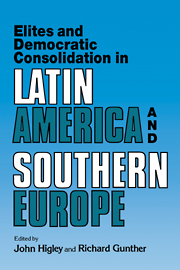Book contents
- Frontmatter
- Contents
- About the contributors
- Preface
- 1 Introduction: elite transformations and democratic regimes
- 2 Spain: the very model of the modern elite settlement
- 3 Elite settlements and democratic consolidation: Colombia, Costa Rica, and Venezuela
- 4 Mexico's elite settlement: conjuncture and consequences
- 5 Elite unification and democratic consolidation in Italy: a historical overview
- 6 The role of civil–military pacts in elite settlements and elite convergence: democratic consolidation in Uruguay
- 7 Patterns of elite negotiation and confrontation in Argentina and Chile
- 8 Elites in an unconsolidated democracy: Peru during the 1980s
- 9 Brazil's political transition
- 10 Redefining the Portuguese transition to democracy
- 11 The Dominican case
- 12 Elites and democratic consolidation in Latin America and Southern Europe: an overview
- Index
7 - Patterns of elite negotiation and confrontation in Argentina and Chile
Published online by Cambridge University Press: 05 June 2012
- Frontmatter
- Contents
- About the contributors
- Preface
- 1 Introduction: elite transformations and democratic regimes
- 2 Spain: the very model of the modern elite settlement
- 3 Elite settlements and democratic consolidation: Colombia, Costa Rica, and Venezuela
- 4 Mexico's elite settlement: conjuncture and consequences
- 5 Elite unification and democratic consolidation in Italy: a historical overview
- 6 The role of civil–military pacts in elite settlements and elite convergence: democratic consolidation in Uruguay
- 7 Patterns of elite negotiation and confrontation in Argentina and Chile
- 8 Elites in an unconsolidated democracy: Peru during the 1980s
- 9 Brazil's political transition
- 10 Redefining the Portuguese transition to democracy
- 11 The Dominican case
- 12 Elites and democratic consolidation in Latin America and Southern Europe: an overview
- Index
Summary
The three countries of Latin America's Southern Cone – Chile, Argentina, and Uruguay – followed quite distinct political paths during the twentieth century. These paths, however, have converged during the last two decades. First, the three countries experienced successful military coups during the 1970s; later, during the 1980s, all three military regimes were replaced by constitutional democracies. This chapter focuses on the cases of Chile and Argentina. In Chile, the military regime was installed in 1973, when the armed forces violently deposed the socialist government of Salvador Allende; in Argentina, the military regime was initiated in 1976 when a military junta put an end to the chaotic populist regime led by Isabel Peron. I shall examine two related issues: (1) the legacies of the two countries' preauthoritarian pasts and the way that those legacies have contributed to shape each country's transition to democracy and (2) the patterns of elite behavior during the transitions and the likelihood that political democracy will be consolidated.
The successful Chilean transition to democracy (which unfolded between 1988 and 1990) and the prospects for its consolidation were greatly facilitated by what appears to have been an elite settlement with two distinct phases. This process involved, on the one hand, an agreement between the Christian Democrats and a segment of the socialist left that led to the formation of what I shall call the antiauthoritarian Grand Coalition and, on the other hand, a relatively comprehensive settlement between this Grand Coalition and a portion of the elites that had supported the authoritarian regime of General Augusto Pinochet.
- Type
- Chapter
- Information
- Publisher: Cambridge University PressPrint publication year: 1991
- 5
- Cited by



